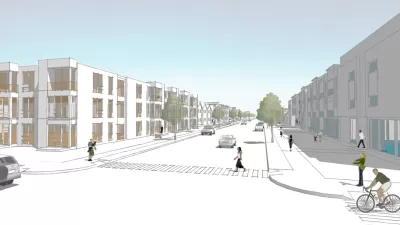The city of Portland is considering a new inclusionary zoning policy, but some believe that inclusionary zoning has the opposite of its intended effect.

The debate about inclusionary zoning as a policy solution for housing affordability shifts to Portland, Oregon, where the city is beginning to consider the terms of a new inclusionary zoning policy.
The inclusionary zoning policy is up for debate following a decision by the state to repeal a statewide ban on inclusionary housing requirements. With Portland ready to consider a new inclusionary zoning policy, the Northwest Chapter of the Urban Land Institute recently held a forum to discuss inclusionary zoning, which Joe Cortright attended as a panelist.
Cortright shares a few of his talking points, some of which he’s made in the past, which focus on the idea that inclusionary zoning might not be an effective tool to improve housing affordability.
The bigger concern about inclusionary zoning is that it tends to drive up the cost of building new housing, thereby restricting supply, and actually aggravating market-wide affordability problems. While the comparative handful of new units set aside for low or moderate income households are visible, there is an invisible cost in the form of units not built, and consequently, higher market rents for everyone.
Mike Wilkerson of ECONorthwest also participated in the event, presentinga summary of his firm’s recent analysis of inclusionary policies (commissioned by the Urban Land Institute), which joins a growing joins what Cortright describes as a “growing body of research that attempts to model current development costs and the impacts of inclusionary (and other) requirements on the cost and likelihood of housing development.” One of the takeaways that Cortright has identified from all this research is a great deal of uncertainty over the effects of policy changes, like inclusionary zoning, and the future of the development market.
FULL STORY: Portland considers inclusionary zoning

Planetizen Federal Action Tracker
A weekly monitor of how Trump’s orders and actions are impacting planners and planning in America.

San Francisco's School District Spent $105M To Build Affordable Housing for Teachers — And That's Just the Beginning
SFUSD joins a growing list of school districts using their land holdings to address housing affordability challenges faced by their own employees.

The Tiny, Adorable $7,000 Car Turning Japan Onto EVs
The single seat Mibot charges from a regular plug as quickly as an iPad, and is about half the price of an average EV.

Seattle's Plan for Adopting Driverless Cars
Equity, safety, accessibility and affordability are front of mind as the city prepares for robotaxis and other autonomous vehicles.

As Trump Phases Out FEMA, Is It Time to Flee the Floodplains?
With less federal funding available for disaster relief efforts, the need to relocate at-risk communities is more urgent than ever.

With Protected Lanes, 460% More People Commute by Bike
For those needing more ammo, more data proving what we already knew is here.
Urban Design for Planners 1: Software Tools
This six-course series explores essential urban design concepts using open source software and equips planners with the tools they need to participate fully in the urban design process.
Planning for Universal Design
Learn the tools for implementing Universal Design in planning regulations.
Smith Gee Studio
City of Charlotte
City of Camden Redevelopment Agency
City of Astoria
Transportation Research & Education Center (TREC) at Portland State University
US High Speed Rail Association
City of Camden Redevelopment Agency
Municipality of Princeton (NJ)




























